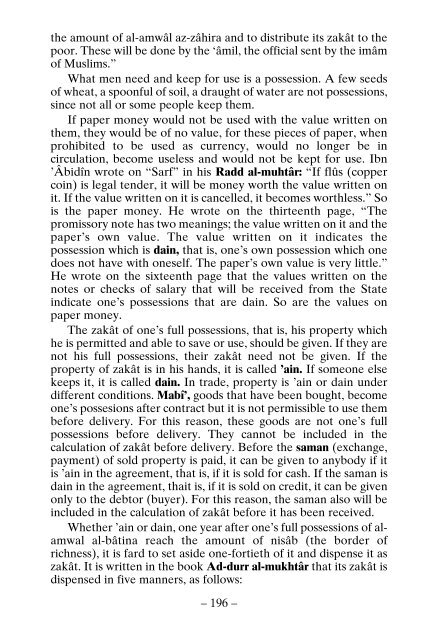Islams Reformers
The bigotry of the religion reformers or bigots of science who surfaced lately to blame all previous scholars, basic fundamental beliefs or practices
The bigotry of the religion reformers or bigots of science who surfaced lately to blame all previous scholars, basic fundamental beliefs or practices
You also want an ePaper? Increase the reach of your titles
YUMPU automatically turns print PDFs into web optimized ePapers that Google loves.
the amount of al-amwâl az-zâhira and to distribute its zakât to the<br />
poor. These will be done by the ‘âmil, the official sent by the imâm<br />
of Muslims.”<br />
What men need and keep for use is a possession. A few seeds<br />
of wheat, a spoonful of soil, a draught of water are not possessions,<br />
since not all or some people keep them.<br />
If paper money would not be used with the value written on<br />
them, they would be of no value, for these pieces of paper, when<br />
prohibited to be used as currency, would no longer be in<br />
circulation, become useless and would not be kept for use. Ibn<br />
’Âbidîn wrote on “Sarf” in his Radd al-muhtâr: “If flûs (copper<br />
coin) is legal tender, it will be money worth the value written on<br />
it. If the value written on it is cancelled, it becomes worthless.” So<br />
is the paper money. He wrote on the thirteenth page, “The<br />
promissory note has two meanings; the value written on it and the<br />
paper’s own value. The value written on it indicates the<br />
possession which is dain, that is, one’s own possession which one<br />
does not have with oneself. The paper’s own value is very little.”<br />
He wrote on the sixteenth page that the values written on the<br />
notes or checks of salary that will be received from the State<br />
indicate one’s possessions that are dain. So are the values on<br />
paper money.<br />
The zakât of one’s full possessions, that is, his property which<br />
he is permitted and able to save or use, should be given. If they are<br />
not his full possessions, their zakât need not be given. If the<br />
property of zakât is in his hands, it is called ’ain. If someone else<br />
keeps it, it is called dain. In trade, property is ’ain or dain under<br />
different conditions. Mabî’, goods that have been bought, become<br />
one’s possesions after contract but it is not permissible to use them<br />
before delivery. For this reason, these goods are not one’s full<br />
possessions before delivery. They cannot be included in the<br />
calculation of zakât before delivery. Before the saman (exchange,<br />
payment) of sold property is paid, it can be given to anybody if it<br />
is ’ain in the agreement, that is, if it is sold for cash. If the saman is<br />
dain in the agreement, thait is, if it is sold on credit, it can be given<br />
only to the debtor (buyer). For this reason, the saman also will be<br />
included in the calculation of zakât before it has been received.<br />
Whether ’ain or dain, one year after one’s full possessions of alamwal<br />
al-bâtina reach the amount of nisâb (the border of<br />
richness), it is fard to set aside one-fortieth of it and dispense it as<br />
zakât. It is written in the book Ad-durr al-mukhtâr that its zakât is<br />
dispensed in five manners, as follows:<br />
– 196 –

















